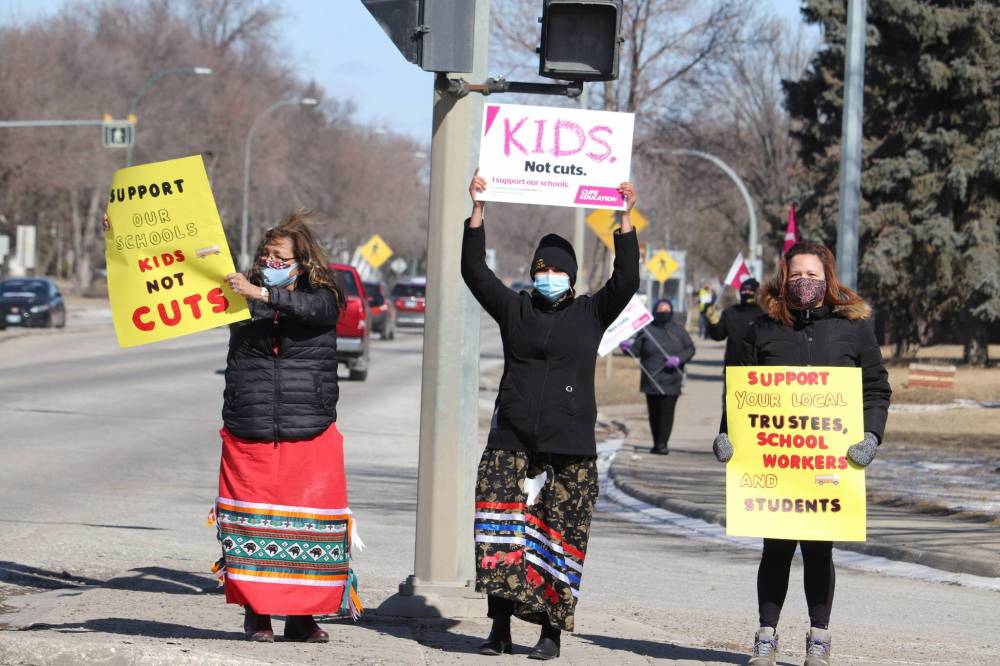Tories flunk education reform
Varied, vocal and sometimes angry opposition forced transitioning provincial government to abandon public school system overhaul
Advertisement
Read this article for free:
or
Already have an account? Log in here »
To continue reading, please subscribe:
Monthly Digital Subscription
$0 for the first 4 weeks*
- Enjoy unlimited reading on winnipegfreepress.com
- Read the E-Edition, our digital replica newspaper
- Access News Break, our award-winning app
- Play interactive puzzles
*No charge for 4 weeks then price increases to the regular rate of $19.00 plus GST every four weeks. Offer available to new and qualified returning subscribers only. Cancel any time.
Monthly Digital Subscription
$4.75/week*
- Enjoy unlimited reading on winnipegfreepress.com
- Read the E-Edition, our digital replica newspaper
- Access News Break, our award-winning app
- Play interactive puzzles
*Billed as $19 plus GST every four weeks. Cancel any time.
To continue reading, please subscribe:
Add Free Press access to your Brandon Sun subscription for only an additional
$1 for the first 4 weeks*
*Your next subscription payment will increase by $1.00 and you will be charged $16.99 plus GST for four weeks. After four weeks, your payment will increase to $23.99 plus GST every four weeks.
Read unlimited articles for free today:
or
Already have an account? Log in here »
Hey there, time traveller!
This article was published 28/12/2021 (1446 days ago), so information in it may no longer be current.
Forget plastic flamingos and garden gnomes. The most popular lawn ornament in the province in 2021 was a sign denouncing Bill 64.
The introduction of the Education Modernization Act — now-defunct Tory legislation that would have overhauled the public school system by replacing elected boards with a provincial authority of government appointees — gave rise to protest in every corner of the province.
Upwards of 500 people, a record in the Manitoba legislative assembly, signed up to speak about the controversial bill at the committee stage. Many of them took issue with the legislation scrapping accountability in public education by abolishing local trustees who govern school policies and advocate for changes in classrooms on behalf of families.

The 309-page document, however, was thrown out before presenters could vocalize their frustrations at 450 Broadway.
“It’s infuriating to think that tens, if not hundreds of thousands, of Manitobans were consumed in fighting their own government’s plans, which were ill-conceived, ill-planned and terribly communicated,” said Alan Campbell, president of the Manitoba School Boards Association, a natural opponent to the bill that sought to eliminate its existence.
“You take that incredible stress, anxiety and waste of time and money (linked to Bill 64), and layer that on top of a global pandemic, and you just have to shake your head.”
The Progressive Conservatives have repeatedly pledged to “modernize” the school system and improve outcomes for learners, citing concerns that standardized test scores in Manitoba trail behind those in other jurisdictions. (Critics argue those scores are a reflection of high child-poverty rates in the province.)
In January 2019, when remote learning was still a niche concept, the Pallister government established a commission to undertake a wide-ranging review of the K-12 system to create a road map.
The start of the COVID-19 pandemic delayed the much-anticipated March 2020 release of the commission’s report.
When it was finally released on March 15, 2021, its contents — including 75 recommendations, one of which called on the province to downsize its roster of school boards and restructure them to incorporate both elected and appointed trustees — were overshadowed by Bill 64.
The province published more than 500 pages of education-related materials among the review report, Bill 64, its Better Education Starts Today implementation strategy and a list of lessons learned during the pandemic, all at once.
At the time, Education Minister Cliff Cullen said Bill 64 would create a “consistent, efficient and student-focused” school system.

The legislation would have abolished every school division in Manitoba but the Division scolaire franco-manitobaine, owing to minority language rights. In their place, the province planned to create a centralized authority governed by a board of six to 11 people, at least two of whom had to be parents of current public school students.
The authority, which was slated to come into force by July 1, 2022, was supposed to oversee 15 regional offices and determine the official school programs operated in the jurisdictions. All six existing Winnipeg-area divisions were to be consolidated into a single region.
Cullen said the governance remodel could redirect up to $40 million in duplicative administration costs across 37 school board offices to front-line classrooms. Last year, the total price tag of public education in the province was $2.5 billion.
Bill 64 also set out to disband parent advisory councils in schools and establish so-called school community councils in their place. These updated councils were pitched as entities that would be set up in every school to give caregivers key advisory roles in everything from making hiring decisions to assessing student achievement data.
For months, the education minister’s talking points emphasized the powers parents would have in the overhauled model and the high number of school trustee acclamations. His government would later learn that parents had no real interest in volunteering to take on many of the roles paid trustees currently do throughout the academic year.
“As a working parent, I’m already busy. I do support my PAC, but I certainly don’t have time to do more and I don’t necessarily think that me, as a parent, or other parents I know, have the expertise that elected trustees have,” Winnipeg mother Shawna Ferris told the Free Press in April.
Not long after the legislation was tabled, the school boards’ association, teachers’ society, official Opposition NDP and Manitoba Liberals launched respective campaigns to call for the shredding of Bill 64. All of those opponents designed their own anti-Bill 64 lawn signs, which would be distributed by the thousands.
The Manitoba Association of Parent Councils soon joined the movement. Grassroots groups, including Parents for Public Education MB, Protect Ed MB and Rural Voices United, formed with a sole purpose of destroying the legislation. Throughout the summer, municipalities began passing motions to make clear their opposition to dismantling their partner boards.

Community members questioned how the new system would be accountable, representative and equitable. They wanted to know why the bill ended a moratorium on school closures and a cap on school bus commutes longer than an hour, while including a clause that would allow parents to pull students from lessons on “potentially sensitive content.” The timing of the sweeping changes — which were introduced amid a pandemic that heightened family stress and educator burnout — was also put under the microscope.
Opponents partook in rallies and letter-writing initiatives to make their voices heard. Some even started a “Kill-the-Bill” marching band to parade around Winnipeg to raise awareness about their cause.
Despite mounting concerns, Cullen called the opponents to the legislation a “vocal minority” and claimed they were spreading misinformation. He and his PC peers remained steadfast in their support for Bill 64 for the next five months.
The province spent nearly $900,000 on consultants who designed the authority board structure and created both advertisements and promotional materials about its education reforms, data obtained by the NDP through a series of freedom of information requests revealed.
A turning point took place in the summer when former premier Brian Pallister, whose government introduced the bill, announced he would be stepping down as leader of the Tory party.
During her campaign launch for the leadership in mid-August, Heather Stefanson proclaimed she would throw out Bill 64 if elected. The announcement was immediately applauded by caucus colleagues surrounding her at the event. Cullen was seen clapping and smirking.
The legislation, along with four other controversial bills that were delayed from the spring session, were deemed dead on the first day Kelvin Goertzen took the reins as Manitoba’s 23rd premier on an interim basis Sept. 1. After being sworn in, Goertzen, who oversaw the K-12 review during a former stint as education minister, declared Manitoba’s next premier should begin with a blank legislative agenda.
Cullen called the new governance model in the legislation a “lightning rod” and announced next steps during a solemn news conference held the next day. “Our priorities are wanting to make sure our students and staff are safe over the next few months as we battle the fourth (COVID-19) wave,” he said on Sept. 2.
To celebrate the official proceedings, which involved elected officials unanimously withdrawing the bill in October, longtime critics gathered for a ceremony outside the Manitoba legislature to — literally — trash the document.

The whole ordeal increased public engagement in K-12 education throughout 2021, said Campbell, a trustee and parent from the Interlake area who oversees the provincial school boards association. Campbell said more people are paying attention to board operations now than they were before anti-Bill 64 signs littered lawns across Manitoba.
That claim will be tested during municipal election races in 2022.
Members of the public mobilized in droves to oppose the termination of trustees. Whether they will actually cast a ballot for a local school board representative in upcoming elections — which are known for having dismal turnout rates — remains to be seen.
maggie.macintosh@freepress.mb.ca
Twitter: @macintoshmaggie

Maggie Macintosh reports on education for the Winnipeg Free Press. Funding for the Free Press education reporter comes from the Government of Canada through the Local Journalism Initiative.
Our newsroom depends on a growing audience of readers to power our journalism. If you are not a paid reader, please consider becoming a subscriber.
Our newsroom depends on its audience of readers to power our journalism. Thank you for your support.


